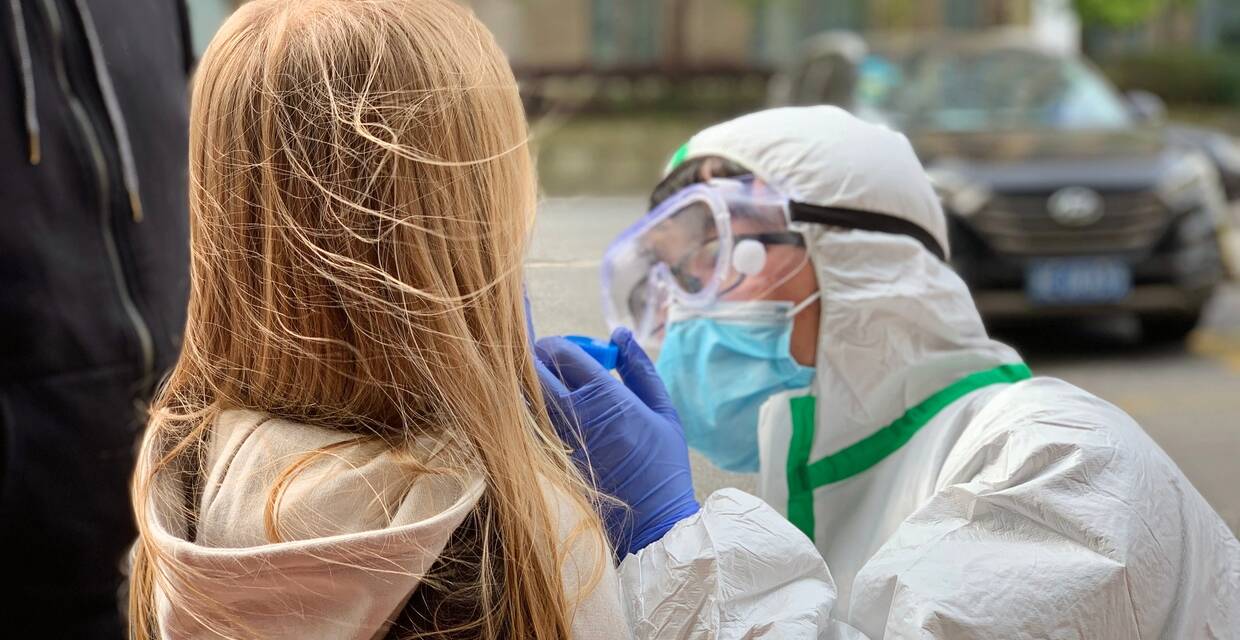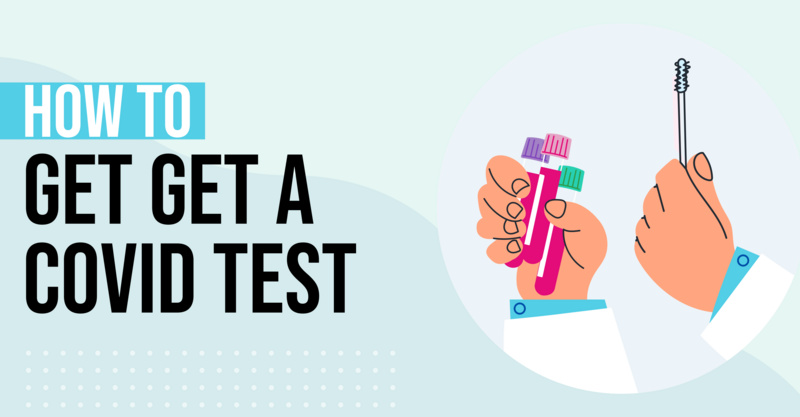Key Points
- The COVID-19 nasal swab test is more sensitive than a throat swab, producing fewer false negatives. Despite the discomfort, it remains the most reliable method for testing.
- There are two types of tests to determine if someone is currently infected with COVID-19: molecular tests and antigen tests. Molecular tests detect the presence of SARS-CoV-2 genetic material, while antigen tests look for viral proteins.
- Antibody COVID tests can indicate if someone was previously infected with COVID-19. However, it's unclear if a positive antibody test means you're immune from getting COVID-19 again.
- The speed of the results of a diagnostic COVID test depends on the exact test. Some tests can provide results within minutes, while others may take up to a week.
- The accuracy of diagnostic COVID tests is high, especially for molecular tests. However, "rapid" or "point-of-care" tests may produce false negatives, so it's recommended to confirm those results with a molecular test.
With descriptions like a “brain biopsy” and “getting stabbed in the brain”, if the COVID-19 nasal swab test were a restaurant, there's no way it would have a five-star Yelp rating. “It was quite uncomfortable, as the swab went much further up my nose than anything I'd experienced before,” says Alice Scharf, 24, of New Hampshire. “It wasn't painful, but more ticklish mixed with discomfort and the feeling definitely made me want to cough or sneeze.”
But this COVID test is more sensitive—and therefore produces fewer false negative results—than a throat swab. And even as researchers develop tests using shorter swabs and collecting spit, it's unclear how soon any of these might be widely available. So it seems the swabs will be around for a while yet.
So too will antibody tests for COVID. But these tests tell you something different than the results of a diagnostic test. And according to a Cochrane review, when used at the “wrong time”, antibody tests don't work. Still, that doesn't mean they can't be useful.
It's all confusing, to say the least. To help clear things up, here is the most up-to-date information on diagnostic COVID tests, antibody COVID tests, and the differences between the two.
What do molecular COVID tests test for?
Two tests exist to determine if someone is currently infected with COVID-19: molecular tests and antigen tests. Molecular tests detect if there's any presence of genetic material of SARS-CoV-2, the virus that causes COVID-19. On the other hand, antigen tests look for viral proteins.
What do antibody COVID tests test for?
Antibody COVID tests may be able to tell if someone was previously infected with COVID-19. These tests search for the presence of proteins (antibodies) that the immune system releases to fight off SARS-CoV-2.
I keep hearing different names for the COVID tests. Can you clear up the confusion?
Both types of tests go by several names. The molecular COVID test has several aliases: diagnostic test, viral test, nucleic acid amplification test (NAAT), RT-PCR test, and LAMP test. The antigen COVID test also goes by the “rapid diagnostic test”, even though some molecular tests are considered rapid.
The antibody COVID test is also called a serological test, serology, blood test, and serology test.
What is the diagnostic COVID test procedure?
Both molecular and antigen COVID tests can be conducted using nasal swabs. These swabs look a bit like Q-tips that are about six inches long and skinnier on the end that's inserted into the nose. The person doing the test inserts the swab to collect a sample from the nasopharynx—this is where the upper part of the throat meets the very back of the nose. In order to collect the best specimen, the tester twirls the swab around and then slowly removes it while continuing to spin it. Each nasal passage is swabbed. The swab or swabs are then sealed in a tube and sent for analysis.
Another option for both diagnostic tests is a throat swab. In this instance, the person collecting the sample uses a long swab that doesn't taper to swab the back of the throat where the tonsils are. Again, the swab is sealed in a tube and sent to a lab for analysis.
Lastly, a few molecular COVID tests use saliva samples. For these tests, you spit into a tube that's then sealed and sent to be analyzed.
What is the antibody COVID test procedure?
For an antibody test, a blood sample is taken using either a finger prick or by drawing blood from an arm vein.
What is the diagnostic COVID test like?
Nobody would jump up and down out of excitement about having a nasal swab inserted way back into their head. Everybody's experience is a little different. Overall, this COVID test is uncomfortable and can cause feelings of pressure or stinging, as well as a gagging reflex, coughing, sneezing, or watery eyes. But it's all very short-term; each swab takes only a few seconds. Both the throat swab and the saliva test are more comfortable, although the throat swab can sometimes activate your gag reflex.
What is the antibody COVID test like?
Being tested for COVID antibodies is just like any blood test. You feel the prick of the needle and may have some bruising afterward where the needle was entered. Some people may feel dizzy or faint, especially if they stand up too quickly after having their blood drawn. But most people experience no side effects.
How soon will I receive the results from a diagnostic COVID test?
The speed of the results of a diagnostic COVID test depends on the exact test. If the molecular test needs to be sent to a lab, it can take up to a week to receive results. But if the test is analyzed on site, results are available that day, if not in minutes. At least one “point of care” molecular test claims to offer positive results in five minutes and negative results in about 15 minutes. On the other hand, antigen diagnostic COVID tests provide a result within minutes or up to an hour.
How soon will I receive the results from an antibody COVID test?
As with diagnostic tests, the results of an antibody COVID test depend on the actual test. At most, it can take up to three days to receive antibody test results; most often, results are available within a day.
What does a positive diagnostic COVID test mean?
If you test positive with a molecular or antigen COVID test—even if you have no symptoms of COVID-19—you have the virus. Isolate for at least 10 days following your test or follow the recommendations of your local health department or healthcare provider. If you live with others, avoid contact with them as much as possible. If you can, stay in your own room, use your own bathroom, and don't share any items. When you must be around anyone else, have everyone wear a mask and wash their hands afterward. Seek medical care immediately if your symptoms become severe. After 10 days, if you were asymptomatic the entire time, consult your healthcare provider to see if you should get tested again.
What does a positive antibody COVID test mean?
A positive antibody COVID test likely indicates that you were previously infected with SARS-CoV-2. However, a positive COVID test may indicate you have antibodies from another coronavirus infection. (Seven coronavirus can infect humans.) Either way, it’s still unclear whether a positive antibody test indicates that you are immune from getting COVID-19 again as there have been a few instances of individuals getting COVID multiple times.
We don’t know how long any antibodies remain in the body, as well as if any remaining antibodies protect against reinfection. The initial evidence may seem concerning. According to one study published online in July and not yet peer-reviewed, antibodies may only stick around for 20 to 30 days after symptoms appear. Another research paper published a week later in the New England Journal of Medicine reported that, in 34 people with mild cases of COVID, antibodies against SARS-CoV-2 appear to decline by about half every 73 days. And an earlier study on patients in China found that, two months after recovering, levels of the antibody IgG were undetectable in 40 percent of asymptomatic patients and 13 percent of those who’d had symptoms.
But don’t freak out yet. This decline appears to be the natural progression of COVID and other coronaviruses. Also, antibodies aren’t the only fighter in our immune system. In the case of COVID, memory T-cells appear to play an important role. These cells are programmed to recognize a protein specific to a certain virus. If they detect it, they will fight any infected cells. Research suggests these T-cells may provide longer-lasting protection against COVID, and that, even if someone does not have detectable COVID antibodies, they may have a strong T-cell response to the virus.
Lastly, animal studies suggest that a mild COVID infection protects rhesus macaques from a second infection. While this is promising since we share about 93 percent of our DNA, we don’t know if this is also true for humans. Still, the bottom line is: We continue to learn more about COVID and immunity for the virus. At this time, antibody tests don’t appear to give the entire picture on an individual’s risk for contracting COVID.
What does a negative diagnostic COVID test mean?
Molecular tests for COVID-19 are highly accurate. According to a list published by Johns Hopkins’s Center for Health Security, the molecular tests with FDA Emergency Use Authorization have a sensitivity rating of at least 88 percent, with most scoring 95 percent or above. The higher the sensitivity score, the less likely a test is to deliver false negative results. False negatives are when a test comes back negative, but the person is actually positive. In the instance of a COVID molecular test, a false negative would mean that person actually has COVID. However, given the sensitivity of molecular COVID tests, a negative test indicates you do not currently have the virus.
On the other hand, the two antigen COVID tests on the Center for Health Security’s list have sensitivity ratings of 80 and 84 percent. Because they have a higher change of yielding false negatives, the CDC says it's best to confirm those results with a molecular test.
Since both molecular and antigen COVID tests are performed the same way, the only way to know which you had is to ask. When you schedule your appointment with a provider or arrive at a drive-thru testing site, ask which type of test you are having done. It’s important to know the lingo: A viral test, nucleic acid amplification test (NAAT), RT-PCR test, and LAMP test all mean you had a molecular test. On the other hand, antigen COVID tests are sometimes called rapid COVID tests. If you are at all uncertain, ask for clarification.
What does a negative antibody COVID test mean?
A false negative antibody test means you have no COVID-19 antibodies and likely have never had the virus.
How accurate are diagnostic COVID tests?
Although molecular tests are considered to be highly accurate when properly performed by healthcare professionals, “rapid” or “point-of-care” tests are less sensitive and may produce false negative results. In one study, Cepheid's rapid test correctly identified 99 percent of positive cases while Abbott's rapid test correctly identified only 74 percent of positive samples. Hence, your healthcare provider may recommend confirming those results with a molecular test. People have reported testing negative with a “rapid” COVID test and then testing positive on a molecular test.
How accurate are antibody COVID tests?
If you are interested in a test for COVID antibodies, talk to your healthcare provider to discuss which antibody test they recommend. It can be very confusing for non-healthcare professionals to interpret all of the data.
See, some antibody tests have been shown to be more accurate than others. If you're interested, the FDA maintains a list of performance data on the antibody COVID tests currently authorized for use by the FDA. This list includes each test’s sensitivity and specificity ratings. The higher the sensitivity, the lower the chance of the test producing false negative results. False negatives are when a test comes back negative but a person actually has COVID. The higher a test’s specificity rating, the lower the chance of it producing false positive results. False positives are when a test result is positive but a person does not actually have COVID.
Additionally, the accuracy of antibody tests depends in part on the timing of the COVID test. It takes about one to three weeks after infection for the body to produce antibodies, but some people may take longer and others may never develop antibodies. Antibody tests appear to be most accurate when used two or more weeks after the onset of symptoms.
However, at this point we don’t know if the presence of antibodies means someone is immune to COVID-19. Although there have been anecdotal reports of reinfection, none of these cases have been confirmed. Additionally, studies on rhesus monkeys found that having COVID once protected against reinfection. Lastly, antibody tests fail to measure the level of T-cells, which appear to play a role in fighting off the virus.
In short, immunity against COVID-19 is complex and we still need more research to understand what, if anything, the results of antibody COVID tests tell us. It’s best to continue to follow the guidelines to protect yourself against COVID. And if you experience any symptoms or think you may have been exposed, molecular COVID tests are the most accurate type of diagnostic test. The momentary discomfort is worth the peace of mind of the results.
Frequently asked questions
What types of tests are available to determine if someone is infected with COVID-19?
There are two tests available to determine if someone is currently infected with COVID-19: molecular tests and antigen tests. Molecular tests detect if there's any presence of genetic material of SARS-CoV-2, the virus that causes COVID-19. Antigen tests look for viral proteins.What are antibody COVID tests used for?
Antibody COVID tests may be able to tell if someone was previously infected with COVID-19. These tests search for the presence of proteins (antibodies) that the immune system releases to fight off SARS-CoV-2.What is the procedure for a diagnostic COVID test?
Both molecular and antigen COVID tests can be conducted using nasal swabs. These swabs are used to collect a sample from the nasopharynx—this is where the upper part of the throat meets the very back of the nose. The swab or swabs are then sealed in a tube and sent for analysis. Another option for both diagnostic tests is a throat swab. Lastly, a few molecular COVID tests use saliva samples.What does a positive diagnostic COVID test mean?
If you test positive with a molecular or antigen COVID test—even if you have no symptoms of COVID-19—you have the virus. You should isolate for at least 10 days following your test or follow the recommendations of your local health department or healthcare provider.What does a positive antibody COVID test mean?
A positive antibody COVID test likely indicates that you were previously infected with SARS-CoV-2. However, it’s still unclear whether a positive antibody test indicates that you are immune from getting COVID-19 again.What does a negative diagnostic COVID test mean?
Molecular tests for COVID-19 are highly accurate. A negative test indicates you do not currently have the virus. However, antigen COVID tests have a higher chance of yielding false negatives, so it's best to confirm those results with a molecular test.How accurate are diagnostic COVID tests?
Molecular tests are considered to be highly accurate when properly performed by healthcare professionals. However, “rapid” or “point-of-care” tests are less sensitive and may produce false negative results.How accurate are antibody COVID tests?
Some antibody tests have been shown to be more accurate than others. The accuracy of antibody tests also depends in part on the timing of the COVID test. It takes about one to three weeks after infection for the body to produce antibodies. However, at this point we don’t know if the presence of antibodies means someone is immune to COVID-19.











